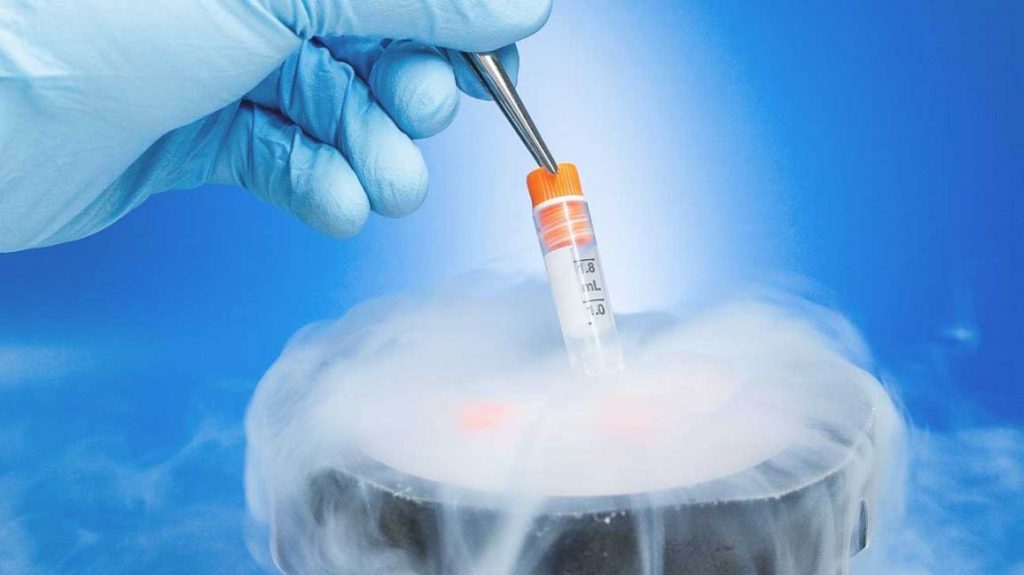Sperm freezing or sperm banking is the process of collecting, analyzing, freezing, and storing a man’s sperm. The samples are later used for fertility treatments or donated to other couples or individuals. This overall process is known as cryopreservation and is sometimes referred to as sperm banking.
The primary benefits of freezing sperm are to allow you to preserve your fertility by using your sperm at a later date or to give an infertile couple or an infertile individual a chance to conceive.
Men can bank their sperm for a variety of reasons, but primarily, sperm banking is recommended for all men who are interested in their future fertility. Common reasons include advancing age, deteriorating sperm quality or low quantity, cancer diagnosis or other medical reasons, etc.
If you’re looking to start a family in the future or you are worried about deteriorating sperm quality, you and your partner may be looking into freezing sperm. Worry not however as sperm banking offers you the option of having your own biological baby.
However, getting the facts about what it’s like to freeze sperm and sperm banking can be elusive.
If you have a very low sperm count it is advised to freeze your sperm before IVF. Surgically extracted sperm is usually frozen for use in future assisted reproductive treatments. If you anticipate delayed childbearing you could consider banking sperm.
Opting to bank sperm is a personal decision, but your partner should be involved. If you are planning to bank sperm, you will undergo blood tests to screen for sexually transmitted infections, as well as a semen analysis to assess sperm parameters. If you are healthy and have good, motile sperm in your ejaculate, you’re a good candidate for sperm banking.
If you want to freeze sperm for the purposes of sperm donation, you should ideally be below 40 years old, healthy, with excellent sperm parameters, and without family histories concerning cancer or other hereditary disease.
You should not bank sperm while getting chemotherapy or if you have zero sperm in the ejaculate. There are generally no risks to banking ejaculated sperm and sperm is not thought to be damaged by freezing since healthy babies are born from sperm frozen for several years.
Fertility preservation for you with sperm freezing is considered in several differing situations. Sometimes sperm needs to be frozen for the short-term but other times you should consider long-term preservation of your sperm.
When freezing sperm, a semen analysis is first performed on the specimen in order to know how many and what quality of sperm are being frozen. The sperms are then divided into different vials depending on the intended future use and frozen in liquid nitrogen.
When stored in liquid nitrogen, the sperm can remain frozen for a few days or many years and will be viable when thawed. For advanced reproductive treatment, you can freeze your sperms. Fertility treatment is stressful, and sometimes that stress can interfere with the production of an adequate semen sample at a critical time.
Sperm can be frozen in advance so that if collection becomes a problem on the day sperm are needed, the frozen sample can be thawed and used for procedures like IUI, IVF, ICSI.
When sperm counts are critically low, sperm can be frozen as a backup for use if the fresh sample does not contain enough sperm for the planned procedure. Sperm freezing enables your partner to continue with fertility treatments while you are not around.
When specimen collection is difficult due to ejaculatory dysfunction, sperm can be stored in advance of when they are needed. If ejaculation is not possible on the day sperm are needed, the frozen specimen can be thawed.
If your work exposes you to chemicals, radiation, extreme heat, etc., you may consider the storage of sperm because these exposures can severely reduce sperm numbers.
Chemotherapy and radiation treatments for cancer can cause permanently low or absent sperm counts. Freezing sperm before these treatments can preserve future fertility.
Sperm number and quality may decrease over time when ejaculation doesn’t occur, such as with spinal cord injury. Hence, cryopreservation of sperm ensures that sperm will be available when it’s time to start a family.
Freezing sperm before vasectomy can preserve fertility and prevent the need for future procedures if personal circumstances change and the desire for children is renewed.
Semen specimens are collected in a private collection room. (It is recommended that samples are collected in a laboratory because the sample’s freshness affects fertility. Within minutes after ejaculation, the number of living sperm cells and their activity begins to drop off rapidly.
There are no risks or side effects to collecting semen samples naturally (through masturbation). If surgical extraction is required, there are small risks, as with any surgery, such as bleeding or discomfort.
Sperm freezing has been successfully used to help individuals conceive healthy babies. The process is safe, standardized, and continues to improve as technology advances.
The primary concern with sperm freezing is that not all sperm survive the freezing and thawing process. However, as most semen ejaculations contain an appropriate number of sperm, the chance of having enough healthy sperm for fertility treatments is very high. The capability of the surviving sperm cells to fertilize an embryo is not jeopardized during the freezing or thawing process.
Cryopreservation is considered to have no time limit, and stored sperm as old as 20 years have been used to create healthy babies.





